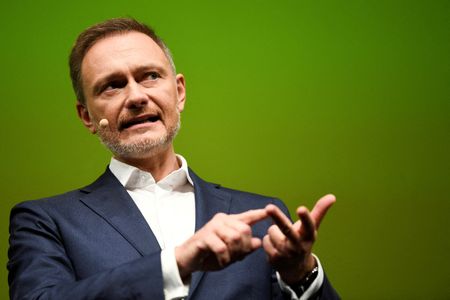By Christian Kraemer and Maria Martinez
BERLIN (Reuters) – German Finance Minister Christian Lindner considers the budget demands made by his government coalition partners to be excessive and “simply unrealistic”, he told Reuters in a TV interview on Monday.
“Their wishes are disconnected from the economic fundamentals,” Lindner told Reuters in response to a question on budget negotiations between his own business-friendly FDP, the centre-left SPD and the Greens.
Lindner said the requested additional spending amounted to about 70 billion euros ($70.78 billion) compared with earlier plans.
According to the finance minister, the demands head into the range of 100 billion euros more per year for the years 2025 and onward.
“It has nothing to do with reality,” Lindner said, adding that these demands could not even be financed with tax increases.
Lindner strongly opposes any such move, in contrast to the other two coalition partners.
The new Defence Minister Boris Pistorius wants 10 additional billion euros for the defence budget next year, according to people with knowledge of the matter. Lindner said he was in favour of increasing defence spending, without giving specific numbers. “However, what is clear is that 10 billion euros more in 2024 than now is an unrealistic figure,” he said.
Lindner said that for this additional funding to be possible, defence spending would have to be considered a priority and then there would be less money available for other sectors.
Municipalities are also requesting additional funding of several billions to take care of the Ukrainian refugees. Lindner said the federal government is already taking care of several hundred thousand people. “Therefore, I would say that the German government has already more than showed its commitment,” he said.
With rising interest rates to tame inflation, Germany now has to pay 40 billion euros in interest payments per year, according to Lindner.
“We don’t have the money for future tasks because we have to pay the debts of the past,” Lindner said. “This policy must end.”
(Reporting by Christian Kraemer, writing by Maria Martinez, editing by Thomas Escritt and Louise Heavens)

